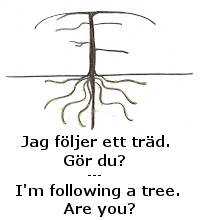
 Det är midvinter men till skillnad från i Rydbergs tomtedikt från slutet av 1800-talet är kölden inte hård och stjärnorna varken gnistrar eller glimmar. Inte heller lyser snön vit på varken fur eller gran, eller på asparna. Det är milt och molnigt och snön på träden har smält. Välkommen till vårt nya klimat! Det enda som känns särskilt vintrigt och juligt är mörkret, och det blåaktiga ljuset den korta stund vi har dagsljus den här tiden på året.
Det är midvinter men till skillnad från i Rydbergs tomtedikt från slutet av 1800-talet är kölden inte hård och stjärnorna varken gnistrar eller glimmar. Inte heller lyser snön vit på varken fur eller gran, eller på asparna. Det är milt och molnigt och snön på träden har smält. Välkommen till vårt nya klimat! Det enda som känns särskilt vintrigt och juligt är mörkret, och det blåaktiga ljuset den korta stund vi har dagsljus den här tiden på året.
It’s midwinter but unlike in Rydberg’s famous poem from the late 19th century the cold isn’t harsh and the stars neither twinkle nor shimmer. Neither does the snow shine white on fires and pines, nor on the aspens. It’s mild and cloudy and the snow on the trees have melted. Welcome to our new climate! The only thing that feels like winter and Christmas is the darkness, and the bluish light of the very short daylight hours at this time of year.
Tomten av Viktor Rydberg finns att läsa på Projekt Runeberg: runeberg.org/rydbdikt/tomten.html
A translation into English of Victor Rydberg’s poem Tomten (”House Goblin”) written by Charles Wharton Stork can be found at page 114 of his book Anthology of Swedish lyrics from 1917: archive.org/details/anthologyofswedi00stor/page/114.
The tomte was a kind of supernatural house god in rural pre-modern society. Worship of ”tompta gudhi” (tomte gods) was first documented in the 14th century but is probably a much older Scandinavian tradition. During the 20th century the old Swedish tomte merged with the American Santa Claus and became ”jultomten”, a symbol of Christmas that gives presents to children on Christmas Eve. According to old folk lore it is very important that you please your tomte by putting a bowl of Christmas porridge, with a generous amount of butter or maybe honey, outside for him to eat on Christmas Eve, which many people still do to this day. Unlike the Christian God the tomte is not the kind of god that loves everyone unconditionally and forgives everyone no matter what. Instead you get what you deserve…
This old American TV-version of Tomten is not actually a translation of the original poem by Rydberg but a translation of a much later version for children by Astrid Lindgren, but it’s still rather sweet:
Fotona är tagna den 14 december 2019.
 Kolla även in andra trädföljare på The Squirrelbasket (internationellt).
Kolla även in andra trädföljare på The Squirrelbasket (internationellt).

Lovely to hear your northern legends!
Watching the old version and reading the subtitles I felt I almost understood Swedish, or at least quite a few of the individual words.
The later version is beautifully drawn, too.
God Jul – and I hope you might join us all again in 2020
God Jul till dig också.
Merry Christmas to you too.
I just watched the old video and enjoyed it very much! Of course I couldn’t understand the story (read it instead), but it sounds wonderful, the Swedish is so lilting. It would be terrific to have a tomte! I would be happy to put out oatmeal for it, with lots of butter and honey.
I’m sure your tomte would be pleased and in return bring you plenty of success and happiness.
what a sweet little story/poem. Frances